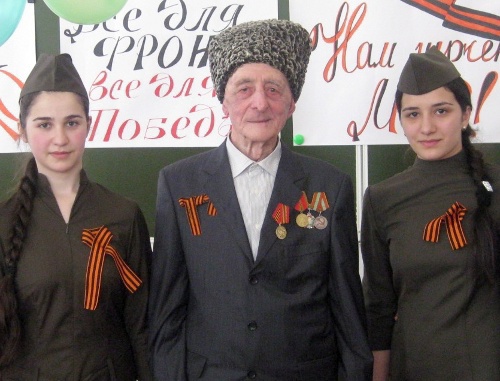
12 May 2011, 23:30
Mizieva: biography of every Malgobek veteran is a plot for individual film
"Oil Capital of Ingushetia. Malgobek - City of Military Glory" - this is the name of the documentary, which was screened on May 10 by the "Mir" TV Channel. The authors of the film - a well-known script-writer Javanshir Danoguev and Lydia Mizieva - focused spectators' attention on biographies of five World War II veterans, residents of this city, who were among the defenders of Malgobek.
The "Caucasian Knot" correspondent has learnt from film producer Lydia Mizieva that after the war Malgobek was rebuilt almost from scratch. "This town passed from hand to hand for 14 times. For Fascists it was very important to break through the defences and reach Grozny oil and then Baku oil. The fights here was brutal; however, aggressors could not overcome 90 kilometres and reach Grozny," said Lydia Mizieva.
According to historian Tamara Yandieva, until now nobody knows the exact number of victims. "Malgobek has plenty of mass graves in its territory, where not only fighters-defenders of the city, but also civilians were buried. When Fascists took Malgobek another time and found that all oil wells were blocked, they brought together all the inhabitants of the town and surrounding villages - mostly women, children and elderly persons - and shot them all," said Tamara Yandieva.
The authors of the documentary "Oil Capital of Ingushetia. Malgobek - City of Military Glory" have accented the attention of the audience on biographies of five veterans, residents of this city, who were among defenders of Malgobek.
Mutalip Velkhiev in one of the battles was heavily wounded in his legs and at the end of the Malgobek battle he lost an eye. After the Malgobek battle he was demobilized.
Sergeant Mukharbek Khashagulgov fought till 1944; and when Germans approached Malgobek, he was 16 years old.
When the war started, Musa Atigov was not yet 17 years old; and he went to get drafted under the summon of his elder brother Magomed, who was not at home at that moment. In the course of the Kursk Battle Musa was wounded and was under threat of amputation of both legs; however, doctors at the Irkutsk hospital, where he stayed till the end of the war, managed to save the soldier's legs.
When Chechens and Ingushes were deported in 1944, most soldiers and officers of these nationalities were deprived of all awards and titles and sent to exile. Ziyaudin Gaitukiev has another name - Nikolai Dmitrievich, this name was written in his soldier's book. When the soldier learnt his nationals were deported, and he - Gaitukiev - would have been send to exile as a "people's enemy", he went to the regiment clerk and asked to change his nationality and write in a Russian name into his soldier's book. Till the end of the war he was Nikolai Gaitukiev. This, however, did not stop special agents after the Victory from "restoring justice" and sending the fighter from homeland to exile.
Military doctor Alaudin Shadiev was caught by deportation near Kharkov, where he served in the frontier troops. "I had to wage war like all soldiers around, and, if necessary, to work as surgeon," said the veteran. His command unsuccessfully tried to save him from deportation.
Now the veterans live in their native Malgobek, which they had defended. They are rather old, but still take part in public life. For example, Colonel Ziyaudin Gaitukiev is the Chairman of the Board of Veterans of Ingushetia and a frequent guest at the Cadet Corps.
In her talk with the "Caucasian Knot" correspondent, Lydia Mizieva noted that the biography of every veteran is a plot for a separate film.
Earlier, the "Caucasian Knot" has reported that war veterans from Chechnya and Karachay-Cherkessia, while remembering the times of the Great Patriotic War, also spoke about Stalin's deportation of their nation. For example, a veteran from Chechnya told that when being at the front, he could not believe that his whole nation was deported. And according to Vladimir Erkenov, Chairman of the Board of War Veterans Karachay City District, some Karachays were helped by their comrades-in-arms to conceal their origin, so that they could continue fighting for their Motherland.
Author: Tatiana Gantimurova Source: CK correspondent




